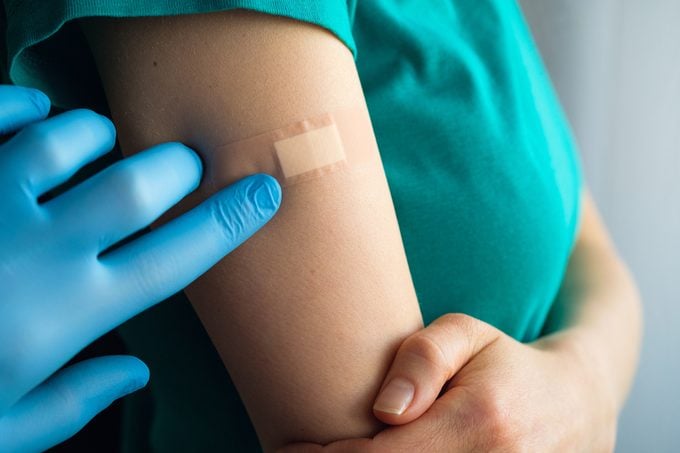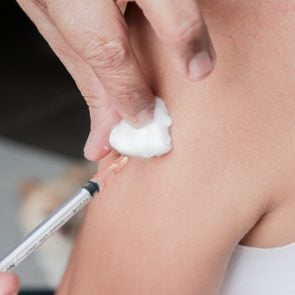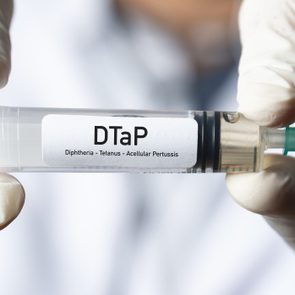How Long Does a Tetanus Shot Last? What You Need to Know
Updated: Aug. 21, 2023
Thanks to the effectiveness and widespread use of the tetanus vaccine and booster shots, there are just 30 cases per year in the U.S. Are you up to date on yours?
Why you need a tetanus shot
Accidents happen.
You step on a rusty nail or cut your hand on a sharp piece of metal.
Your doctor asks when you had your last tetanus shot, but you can’t seem to remember that far back.
It’s likely time for a tetanus booster, says Thomas Murray, MD, PhD, an associate professor of pediatrics at Yale University School of Medicine and the associate medical director for infection prevention at Yale New Haven Children’s Hospital in Connecticut.
When it comes to tetanus, you’re always better safe than sorry, he says.
Commonly known as “lockjaw,” tetanus is an infection caused by soil-dwelling bacteria known as Clostridium tetani.
When this bacterium enters your body, it produces a toxin that causes painful muscle contractions and rigidity. Your neck and jaw muscles can lock, making it hard to open your mouth or swallow, Dr. Murray explains.
“It’s very rare, but tetanus can be a serious and life-threatening disease,” says Dr. Murray.
What is tetanus?
Many vaccine-preventable diseases are contagious. Not tetanus.
Instead, tetanus usually develops from a dirty wound. The bacteria in soil, dust, and manure enter your body through a break in your skin, causing infection.
You can contract tetanus through:
- Dirty wounds
- Puncture wounds
- Burns
- Crush injuries
- Injuries involving dead tissue
- Surgeries
- Insect bites
- Dental infections
- Fractures when bone is exposed
- Chronic sores and infections
- Intravenous (IV) drug use
- Shots given in a muscle
“The bacteria start growing in the tissue and releases minute amounts of neurotoxins,” explains Nicolai van Oers, PhD, a professor of immunology at UT Southwestern in Dallas.
The good news? Tetanus is uncommon in the United States. There are about 30 cases per year, thanks to the effectiveness and widespread use of the tetanus vaccine and booster shots.
Nearly all U.S. cases of tetanus occur in people who did not get all of their recommended tetanus vaccinations, including 10-year booster shots, according to the U.S. Centers for Disease Control and Prevention (CDC).
If you do step on a rusty nail or contract tetanus some other way, Linda Yancey, MD, an infectious disease specialist at Memorial Hermann Hospital, says you can still get a booster after the fact to protect yourself. “The tetanus shot can have benefit if given less than 48 hours after the wound,” she explains.
(Here are some more signs of skin irritation to watch out for.)

How long does a tetanus shot last?
Tetanus vaccines are a part of the normal childhood immunization schedule, but boosters are necessary around every 10 or so years, Dr. Murray says.
Both DTaP and Tdap protect against tetanus, diphtheria, and whooping cough (pertussis). Learn more about the differences between these vaccines.
We all should receive five doses of DTaP at 2 months, 4 months, 6 months, 15 to 18 months, and then again at age 4 or 6. A booster (Tdap) is recommended at age 11 or 12, according to the CDC.
Getting the Tdap vaccine during pregnancy is one of the best ways to keep babies safe.
The tetanus vaccine is safe, Dr. Murray says. The main side effect is pain or soreness at the injection site.
Preventing tetanus
When it comes to tetanus, prudence and prevention go a long way.
Keeping up to date on all vaccines—including tetanus—is essential.
“We are in a setting now due to Covid-19 when people have not been able to access health care, and we know kids are behind in their routine vaccines,” Dr. Murray says.
“We also know that kids are getting injured and getting cuts all the time.”
(Parents also need to be up-to-date on all of their vaccinations.)
Booster shots are important, too.
“If the wound is deep enough to require stitches or medical attention, or just doesn’t look very good and you don’t know when you got your last tetanus shot, a booster won’t cause any damage,” van Oers says.
Doctors can test your blood to see if you have antibodies to tetanus from previous vaccinations, he says.
Half of the antibodies generated by the tetanus vaccine may last up to 14 years, which is longer than previously thought, van Oers says. (This is known as the half-life.)
But some people produce fewer antibodies than others, he notes.
Antibodies don’t tell the full story either, he explains.
“Your body will also remember tetanus, even if you are low on antibodies,” he says. “Your body will immediately see it as foreign, and then your B-cells, which are antibody-manufacturing cells, will crank out antibodies as soon as the threat comes on.”
Still, your best bet is to get a booster if you sustain a dirty wound and don’t know when you had your last tetanus shot, he says.
Treating ‘lockjaw’
There are no tests that can say for certain whether you have tetanus.
If your doctor suspects tetanus during a physical exam due to painful muscular spasms in your neck and jaw or other signs, you will likely be hospitalized.
Other telltale tetanus symptoms may include:
- Shortness of breath
- Problems swallowing
- Drooling
- Rapid heart rate
- Irritability
Tetanus is treated with human tetanus immune globulin (TIG). “This is a serum that has antibodies against tetanus in it,” van Oers says.
Aggressive wound care along with drugs to control muscle spasms and a course of antibiotics is also necessary.
The last word
Tetanus is preventable if you stay on top on your vaccines and make sure your loved ones do the same. Make sure you get a booster every 10 to 14 years.
Next, check out a few other things that actually aren’t contagious.




















